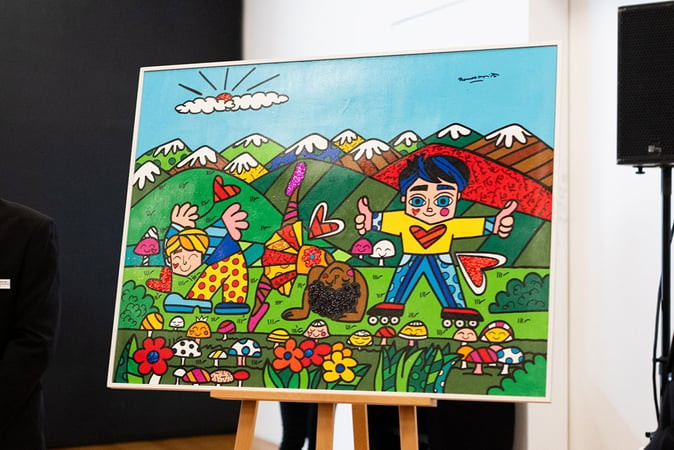Post Liechtenstein’s venture into NFTs is part of a broader trend among national postal services worldwide.
In a groundbreaking move that combines tradition with technology, Philatelie Liechtenstein, the official postal division of the Principality of Liechtenstein, has unveiled its first-ever Non-Fungible Token (NFT) stamp art edition.
Featuring digital artwork from renowned pop artist Romero Britto, this innovative venture sets a new benchmark for the world of philately and digital art. The NFT Stamp Art Edition is a unique offering that combines physical and digital elements. Each package contains a physical stamp featuring a piece of Romero Britto’s vibrant artwork.
Designed as a steel engraving by artists Barbara Bühler and Kurt Spirig “KUSPI”, this special stamp block serves as both a traditional and crypto stamp. Two numbered certificates of authenticity are included, one for the special stamp block and one for the limited art edition with the NFT.
The package also includes a letter from the philatelic ‘building bridges’, which adds an additional narrative layer to the collection. Four VIP tickets for free entry to the Liechtenstein LandesMuseum, along with a choice of sparkling wine, coffee and cake, are part of the package. The first 500 orders include a special gift personally signed by Romero Britto.
The core of this groundbreaking venture lies in creating a limited edition of 1,500 NFTs, each of which gives collectors virtual co-ownership of a larger work of art by Romero Britto. Britto’s original oil painting is proudly displayed in the LandesMuseum of Liechtenstein, the country’s national museum, symbolizing the deep connection between tradition and the digital world that this project represents.
“The piece in the Liechtenstein National Museum not only stands for friendship, but also represents the symbiosis of this partnership and the connection between tradition and the digital world,” Britto said in a statement.
Beyond Post Liechtenstein NFT: new global trend in postal services
Post Liechtenstein’s venture into NFTs is part of a broader trend among national postal services worldwide. The Faroe Islands recently launched an NFT-embedded stamp collection, using real-time weather data to influence digital stamp releases.
The Portuguese Post Office has also released its first NFT stamp, offering owners several rarities and unique benefits. The Netherlands’ PostNL and Austria’s PostAG have also embraced NFTs to modernize philately.
While the adoption of blockchain technology by postal services is exciting, it is essential to recognize Liechtenstein’s pioneering role in this trend. The country started its Stamp 4.0 project in 2021, laying the foundation for this innovative NFT stamp art edition. As postal services worldwide explore the NFT space, Liechtenstein serves as a benchmark for what is possible.
“Stamp collectors today are rarely young people. That is why, together with Post Liechtenstein, we decided to link physical stamps to digital surprises and create an individual data room for each stamp. We are very happy to help preserve the stamp as a great cultural heritage,” said Friedrich Kisters, CEO of DynamicElement AG in a comment.

